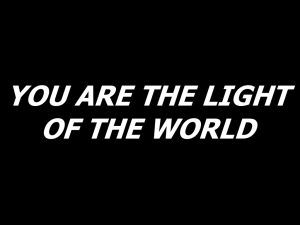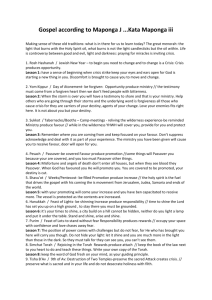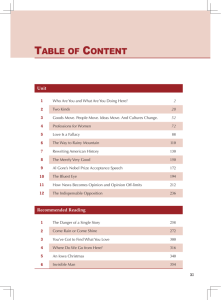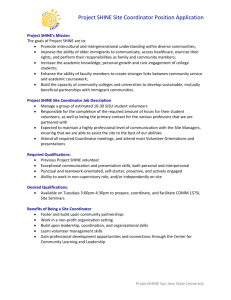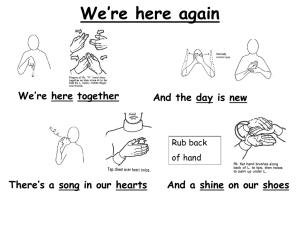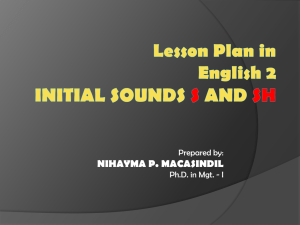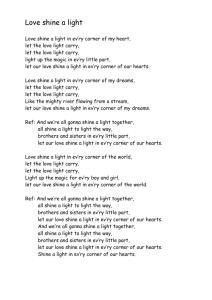Only By Your Presence - Unitarian Universalist Association
advertisement
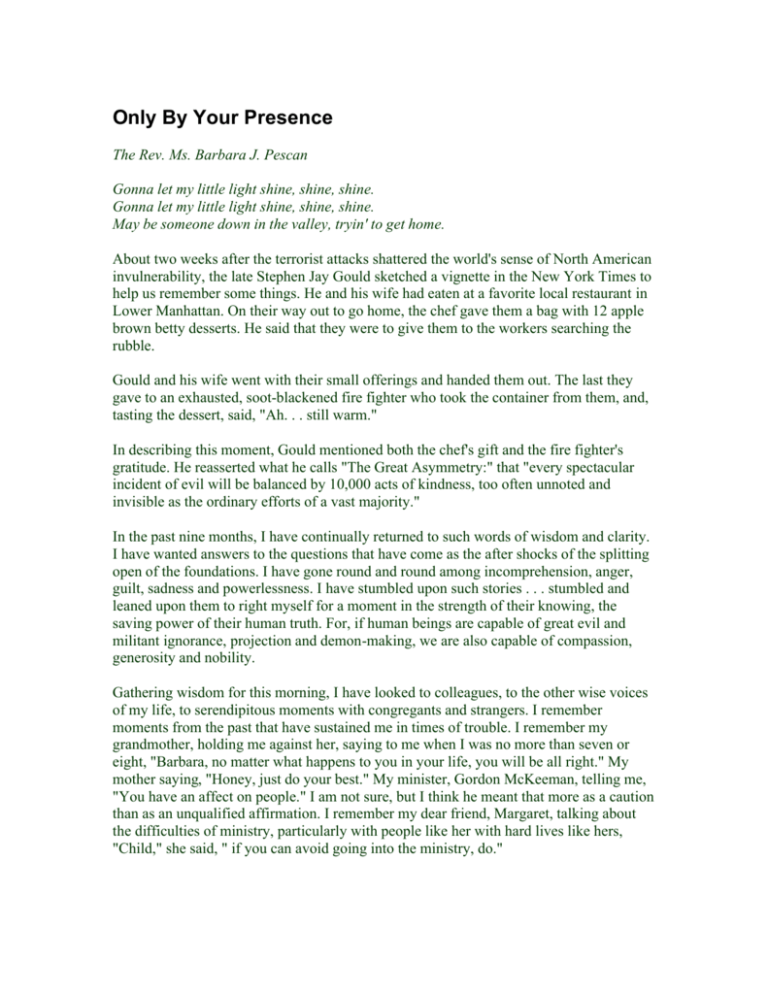
Only By Your Presence The Rev. Ms. Barbara J. Pescan Gonna let my little light shine, shine, shine. Gonna let my little light shine, shine, shine. May be someone down in the valley, tryin' to get home. About two weeks after the terrorist attacks shattered the world's sense of North American invulnerability, the late Stephen Jay Gould sketched a vignette in the New York Times to help us remember some things. He and his wife had eaten at a favorite local restaurant in Lower Manhattan. On their way out to go home, the chef gave them a bag with 12 apple brown betty desserts. He said that they were to give them to the workers searching the rubble. Gould and his wife went with their small offerings and handed them out. The last they gave to an exhausted, soot-blackened fire fighter who took the container from them, and, tasting the dessert, said, "Ah. . . still warm." In describing this moment, Gould mentioned both the chef's gift and the fire fighter's gratitude. He reasserted what he calls "The Great Asymmetry:" that "every spectacular incident of evil will be balanced by 10,000 acts of kindness, too often unnoted and invisible as the ordinary efforts of a vast majority." In the past nine months, I have continually returned to such words of wisdom and clarity. I have wanted answers to the questions that have come as the after shocks of the splitting open of the foundations. I have gone round and round among incomprehension, anger, guilt, sadness and powerlessness. I have stumbled upon such stories . . . stumbled and leaned upon them to right myself for a moment in the strength of their knowing, the saving power of their human truth. For, if human beings are capable of great evil and militant ignorance, projection and demon-making, we are also capable of compassion, generosity and nobility. Gathering wisdom for this morning, I have looked to colleagues, to the other wise voices of my life, to serendipitous moments with congregants and strangers. I remember moments from the past that have sustained me in times of trouble. I remember my grandmother, holding me against her, saying to me when I was no more than seven or eight, "Barbara, no matter what happens to you in your life, you will be all right." My mother saying, "Honey, just do your best." My minister, Gordon McKeeman, telling me, "You have an affect on people." I am not sure, but I think he meant that more as a caution than as an unqualified affirmation. I remember my dear friend, Margaret, talking about the difficulties of ministry, particularly with people like her with hard lives like hers, "Child," she said, " if you can avoid going into the ministry, do." And, Berna Derby, who was a religious educator from Leominster, Massachusetts, once told me the thing that kept me and my partner, Ann, going during a time when we were interviewing search committees, but not being called to a pulpit, either together or singly. I was wondering aloud to her if it was homophobia or being newish to the ministry or something else that got us turned down. She said, "Barbara, you are expecting them to be standing on ground to which they can only be brought by your presence." An odd thought, and not all that comforting when it looked like I might not get to be in the presence of any congregation. Only by your presence. At our ordination, nineteen and a half years ago, my friend, Roz Reynolds, who died this year, said at the end of her charge to me: "Welcome. We have been waiting for you." Another disquieting thought for a recently minted minister to contemplate. Each of us holds in our hearts words like these from loved ones and others. They are solace and goad to our flagging spirits and remind us, in human presence, what we so often may forget of loftier erudition and scripture. Do your best. You will be all right. You affect people. Only by your presence. Colleagues had advice, too. I asked them what they want to hear in this service. I bring their responses to you unadorned: Bring us a global perspective, one said. Another said to remind the clergy in this room: You are allowed to interrupt colleagues with your troubles. Another said, Tell us do not be so inward. Say, we are called to do something about what we believe. And, paraphrasing Marian Wright Edelman, one said to be sure to ask ourselves: How does my ministry of love unfold out in the world where the world can see it? "Our faith is strong," he said. "How frail we are. We need each other, and together, we need this faith." Several colleagues said, "Be yourself. For better or worse, let us see you." They said, "Tell about the transformative presence of ministers in your life." And one said, "Tell a story about your ministry --- not your accomplishments, but how you failed, but life went on." A teacher of mine, about to be eighty years old, said what she wants is to hear that she can, ". . .trust in some profound way that the work will be continued. . . not just the way I've done it, of course, but that the work is important enough to continue." I will pause here to do an advertisement for religious leaders --- ministers, priests, rabbis and senseis, probably imams, gurus, shamans and roshis, too. Even at our very best, we sometimes fail --- we fail and, sometimes, profoundly. We fail not so much at transmitting our traditions (for good or ill...). We fail when we mistake the tradition, the word, for the living presence within it. We succeed when we embody the presence that shines from one to another, that is instantiated and potentiated when persons encounter each other from a place of deep recognition and respect. Moments of succeeding, then, are often quiet and hidden from public view. The proper silence. Accompanying a soul even unto the doors of death. Speaking or withholding speech, and knowing, not as technique, but from deep recognition, what moments call for the one or the other. Moments when we fail also can come and go quickly, almost unnoted: We fail to listen. Our momentary anger or disappointment overcomes our better judgment and without wanting to we speak wounding words. We fail to hear what is below the hardness or anger presented to us by another and, so, miss hearing the essential question. I could list my failings for you without even breaking a sweat. . . This year, as any year, has yielded a rich crop. Instead, let me tell you an event that happened early in my ministry. It is one of those moments that should have set me on course once and for all, but, instead, has become a place to which I must return repeatedly to remember and be healed once again. I tell this story in memory of Mark DeWolfe, whose last ministry was with the church of South Peel, in Mississauga, Ontario. We were classmates at Starr King. We did good work together. He was a friend whose hiccup of a laugh I can still hear when I get quiet enough. I can still feel the energy in his bouncing step. Mark, je me souviens de toi.* In 1984 I was on the first board of the AIDS Pastoral Care Network in Chicago. The AIDS epidemic was primarily among gay men, then. Because I felt it wasn't enough to love the gay men I knew, and to tell them so, often, I scouted around for what I could do to manage my anxiety about AIDS and to be of help. Somehow, I got found by a Claretian brother who was involved in starting the Pastoral Care Network. Through serving on this board, I met John, who was what we then called a "PWA," a Person With AIDS. I knew him for eighteen months. John was an artist. He was six foot six inches tall, blond and good-looking. He was a gentle fellow with many close friends who now and then came to be with him from all over the country. Self-described, he was a "lapsed Presbyterian" and "not very religious." I first met him surrounded by his friends, on the AIDS ward at Cook County Hospital, where he was recovering from his first bad bout with pneumocystis carinii pneumonia. I spent time with him once a month or so. We talked about a lot of things. We avoided talking about others...I asked if he had an attorney, someone who would watch over his health care. I asked if he had a will. He was immensely uninterested in discussing any of this. I stopped asking. I visited him each time he was in the hospital. He showed me his garden. I got to see his Christmas tree, decorated top to bottom, trunk to tip, with tinsel and Polish glass ornaments gathered over many years. And, I was privileged to be with him when, again surrounded by his friends and his family, deeply medicated to ease his suffering, he breathed his last. But, two weeks before that, I visited him in hospice. I don't know where my head was, probably deeply in denial, but I did not realize at first that his death was so close. It was a cold day in October. He weighed about 120 pounds, was very weak, and was lying on the couch in his hospice room. Adjusting to these changes, I sat down in silence. I looked at him and we smiled at each other. Internally, I was reeling: What do I say? My friend is dying. He looks so small. What can I possibly say? At last I heard him ask, "When I die, will you do my memorial service?" I said, Of course. A beat or two of silence passed. John said, "What is a memorial service?" We laughed and I told him about music and readings, and that some friends might say a few things, and that I would pray, if he wished, and say all the good things about him I could think of...and then we could go to his apartment and have chocolate things. He said that sounded just right, and could his friends who sang sing "The White Cliffs of Dover?" Of course. Then, we were silent again. I asked May I do anything for you? He asked, very shyly and quietly, "Yes. Will you rub my butt?" He turned on his side. I sat next to him on the couch and put his lower legs in my lap and carefully massaged his lower back and buttocks --- he had grown so thin, it hurt him to sit or lie for very long on his bones. After a while he said that was enough. I returned to my chair and, again, we sat in silence. Then, he asked if I would go to the bedside table and bring to him the plate that was there. His mother's neighbor had made angel food cake for him. I brought it to him. He broke off a piece and gave it to me, and we ate quietly. Silent again, we looked at each other, just took each other in. He shut his eyes. Shall I go? "I am tired," he said. I put on my coat and kissed him on the forehead. He held my hand. He said, "I love you, Barbara." I said, I love you, John. I left, and two weeks later got the call to come to be with him as he died. The thing is, my silences were not knowing silences. In those moments I was scouring my brain for the "right" words to say. God, in her infinite wisdom, shut my mouth. Because John had the right words to say and mine might have only interfered. He asked the essential question (would I do his memorial service?). He requested a laying on of hands. He gave me communion (remember me). And, he blessed me, saying "I love you." Any clergy person will tell you that hospital visits give us as much as or more than we feel we give to those in the hospital. It is a sweet paradox that we come to comfort people and so often find courage ourselves and depart in awe of the human spirit, its will to survive and its knowing when to depart. In the clinches is where the holy so often appears, when we are up against it and facility with words will not serve to heal nor even name what is going on. We clergy, as well as those who are near death or near giving birth, ride waves of truth too great for naming and, when we remember, we allow ourselves the grace of silence. At the other end of things, in the presence of immensities such as the consequences of evil, our presence is required and our voices are called for. How in the world are we to know what to say in the face of evil? Czechoslovakian Unitarian minister, Norbert Capek told his congregation during the Nazi occupation to remember that even after the worst Winter, Spring will come again and the flowers will bloom. Even when he was in Dachau, he wrote songs and sang them with others. The Universalists of the Philippines have kept faith with their murdered leader's faith and they struggle, still today, to carry forth Toribio Quimada's presence of freedom and joy. The Unitarians of Transylvania, who have been Unitarians since the time of Francis David, though the government of Romania would subsume them, continue to keep faith with David and, now, in partnerships with us. In Prague, on the Island of Negros in the Philippines, in Hungary, Transylvania, the Czech Republic; in Nigeria and in South Africa. All over the world, in the face of fanaticism and dogmatic rigidity, and deep poverty, there also breathes the breath of freedom. Our religious story is not unique. Other ancient truths have spoken of the saving touch, the healing presence, the wisdom of freedom. We partake of the same nurture as the liberalizing movements in all religions that bow before the mysteries of existence, that know that it is in the presence of human beings before each other that saving truths become manifest, that understand that whatever you might name Life's intensity and magnitude, it comes to itself in fleeting moments between us, its earthbound emissaries. We cannot hold it down. None of us can, by naming it one thing or another, make it only ours. Nor can anyone, by denying its existence, make the power in our common life not be. The demonic in religion would claim to make pronouncements for all, claim to speak for that unnameable magnificent intensity. The demonic in religion claims for itself all right and all responsibility for naming who is included in the embrace of the good. What the liberalizing breath of religion can do is continually bring fresh air into the closed and anaerobic proceedings of fanaticism. In November of 1989 when the Berlin Wall was torn down and a month later the Romanian revolution began, and two months after that Nelson Mandela and others were released from their long imprisonment in South Africa --- it seemed that some great turning was taking place. Indeed, now eleven and a half years later, less than a blink in the length of human history, the struggle for freedom deepens. Not only terrorists have brought the world to our North American doors. While big movements and big money are put in place by governments and corporations, smaller events continue to occur among individuals around the world that are also harbingers of freedom and agency. In South Africa, through meeting with the woman who, every day of the year, makes the meals for the hungry people of her township, I discover that twenty U. S. dollars will pay for over 200 meals for the people of Khayalitsha. Our congregation finds that two hundred fifty dollars will defray much of the cost of a year of high school education for a student from Medgyes in Romania, and five families provide scholarships. A group of U. S. high school students traveling to the Khasi Hills in India discover joy in going house to house singing and dancing Khasi Unitarian hymns (dancing to hymns, no less) with the youth and elders of the Khasi Hills. Money is not the only thing needed by those who would be free. Individuals and congregations of religious people have begun relationships of sustained engagement with others in the global village. These connections take North American resources to begin and time to sustain. Communication is often difficult and costly on the other end. Partners in other hemispheres know they also must do some changing for these relationships to be sustainable. Money is not the only thing North Americans have to give. And, the giving does not go all one way. The opportunity to know and to give a hand up to our hard working, faithkeeping counterparts in other countries is a gift beyond measure to North American congregations who may have grown complacent in our freedom. What a difference from the recent past, to have direct contact with individuals and economies in other countries, unmediated by governments or the marketplace. What an opportunity to enliven our faith. In contemplating these small, local, individual acts, these few lines of the American poet, Adrienne Rich, return to me. They are from the end of her poem, "Natural Resources." . . . . My heart is moved by all I cannot save: so much has been destroyed I have to cast my lot with those who age after age, perversely, with no extraordinary power, reconstitute the world. I remember when I was a child of four or so, standing on a pew in golden light at the Romanian Baptist Church, my aunts teaching me to sing the Baptist version of "This Little Light of Mine." I remember it as a song of self-affirmation and childlike faithfulness to the good. (This little light of mine, I'm gonna let it shine. . . Hide it under a bushel, No!. . . Don't let Satan (whoophf) it out. . . Let it shine til Jesus comes! Let it shine, let it shine, let it shine!) And, I sing gladly and loudly the version in our hymnal. Once, though, I heard Bernice Johnson Reagon sing the three lines I sang at the beginning. It tilts the meaning of the song just enough to make the theology larger. Gonna let my little light shine, shine, shine. Gonna let my little light shine, shine, shine. May be someone down in the valley, tryin' to get home. It is time to do more than let our light shine out of our chalices in ritual and remembrance. It is time to aim our lights down there into the valley where someone, surely, is trying to get home, trying to get over, trying to get out of trouble, trying to get on to the morning. It is time to lift our lights and our eyes - it may be we have been focussing our vision too low. It may be, dear colleagues, that we have spent too much of our time preaching against the critic in the front row and too little listening to the hunger of those in the back, who are ready to go on and go out with the message if only someone would remind them often enough why they should. It is more than time to put aside semantic wrangling over differences so we can pay attention to the similarities among us. We need to move toward what resonates and harmonizes among us. Lest our unitary and universal ideas become quaint anachronisms, it is time to relinquish our closely held and vaunted differences and look across religions and cultures for what unites us. It is time to let our light shine, yea, to turn on the path and begin walking, up or down the mountain, all the while scanning the shadows for other lights that are shining back at us -- in the valley, on the next mountain, a little further on, looking for us, looking to help us all get home. Please sing with me, one last time, these three lines. Remember them when you are feeling a fierce and holy boldness; and remember them when you are feeling as if you don't have one more good thing to say or to give. Remember that even on your worst day, your most forgetful, apathetic, cynical, mean- spirited day, someone will see beyond your small self into the holy spark that shines from you and they will be saved from despair. Sing out with intensity, sing like you mean it. Sing it as if you are the one charged to be the keeper of this flame. Sing it as if you are the ones we have been waiting for. Gonna let my little light shine, shine, shine. Gonna let my little light shine, shine, shine. May be someone down in the valley, tryin' to get home. *trans: I remember you (fondly). About the preacher of the service: The Rev. Ms. Barbara J. Pescan is Co-Parish Minister of the Unitarian Church of Evanston, IL.
